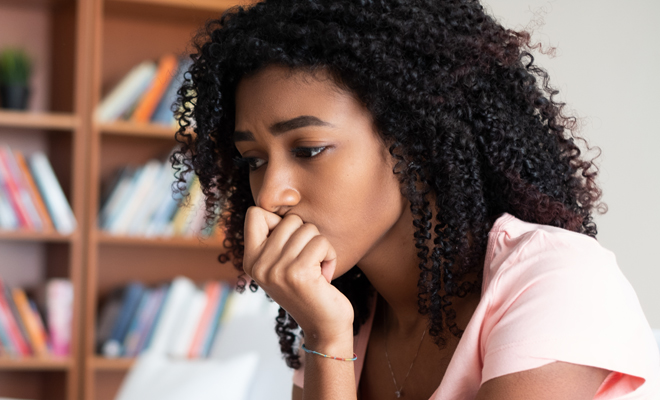Some people seem to have a great facility for socializing with others, even making friends wherever they go. But this is a reality that does not apply to many others; and it is that there are a large number of people who find it difficult to be with people to some extent. It is then that they can ask why they don’t like being with a lot of people or why they get nervous in certain situations.

In these cases it can be about personality traits associated with shyness, which are simply qualities of who we are; but in other cases, this fear that is experienced before events in which it is necessary to socialize may be something a little more serious that can even affect mental health. We talk about anxiety when being with people and we differentiate between shyness and social phobia, concepts that may seem the same but are not.
What is shyness?
Shyness is a personality trait that is characterized by having difficulties establishing interpersonal relationships and acting in situations of a social nature. It is important to understand that this is by no means about some kind of disease.
However, excessive shyness can affect the free development of social and generate a lot of frustration in those who are shy, since they do not seek to be isolated from social situations, on the contrary, they want to be included but do not know how to do it. Of course, everything will depend on each person and how they live it; there are people who are shy and like to be like that. We must assess each case individually.
On the other hand, it is important to note that there are two types of shyness, broadly speaking:
–Temporary shyness: it is one that many people experience throughout our lives and it is only temporary. It is a type of shyness that is overcome over time once we have acquired more social skills. It usually presents in childhood and, in some cases, in adolescence.
–Chronic shyness: this type of lasts over time and can seriously affect the social life of people who suffer from it.
Social phobia: what exactly is it?
When we talk about social we are referring to a disorder related to anxiety. Although it is normal to feel a certain level of anxiety in certain social situations, those who suffer from this pathology often experience very high levels.
In these cases, social situations generate a lot of fear, even preventing the person from exposing themselves to them and avoiding having contact with people outside their closest social environment.
Although it is a disorder with a higher incidence in women, men can also develop this type of pathology and its causes can be very varied.
Significant discomfort is experienced not only by being in social situations, but by the mere possibility of being so. In this sense, one of the thoughts that generates the most fear and that is most recurrent in people with social phobia is the belief that other people will judge their own social behaviors negatively.
Shyness and social phobia: two very different concepts with some similarities
It is very common to find people who believe that being shy and having social phobia are the same thing, but this is a misconception that has become (unfortunately) common. Of course, these concepts may present some similarities, such as:
- Discomfort in social situations.
- Anguish and anxiety at having to be with people.
- Avoiding some social situations.
- Anguish at not knowing how to behave in front of others.
- Fear of being judged.
But although the concepts share similarities, the truth is that their differences are greater. Especially in terms of the severity of the symptoms, their real impact on the life of the person, the degree of discomfort and even behavior:
While being shy can create unease and discomfort when it comes to socializing, a person with shyness can with a little effort overcome that barrier and dare to build relationships with others. For those who suffer from social phobia, the matter is different.
In cases of phobia, the level of anguish is much higher related to one or more social situations. As established in the DSM-5 (Diagnostic and Statistical Manual of Mental Disorders) for its diagnosis, this fear must be present for a period of no less than 6 months.
-This type of fear (social phobia) can even be disabling, causing the person avoid any type of situation in which they have to be exposed to social situations, affecting their entire life.
Tips to overcome and cope with anxiety when being with people
If you feel uncomfortable being with people and this causes you anxiety, you don’t have to worry, as there are several methods to deal with this issue. It does not matter if it is a trait of your personality that you find a little uncomfortable or the existence of a mental disorder; with professional help, you can learn to manage anxiety.
One of the most widely used methods is psychological therapy, specifically cognitive-behavioral therapy, which is responsible for evaluating the thought patterns that trigger anxiety so that by identifying the triggers for anxiety, you can redirect your attention and your thoughts.
It is a very effective therapy; it also includes relaxation techniques that have shown great effectiveness in reducing anxiety-related symptoms.
In more serious cases, in which there is a diagnosis of social phobia and when it greatly affects the person’s life, it is usually treated with exposure methods that are based on, as the name implies, gradually expose the patient to what generates the phobia.
All this is done in a controlled environment and gradually, and must always be guided by a mental health professional, either a psychologist or a psychiatrist dedicated to psychotherapy.
As you can see, there are many ways to deal with anxiety by being with people, always in the hands of a professional who will know how to help you in the best possible way.






